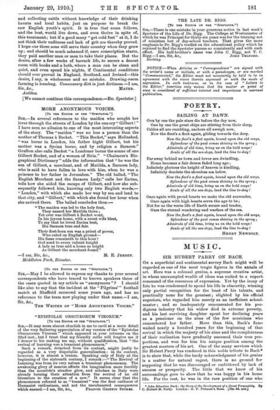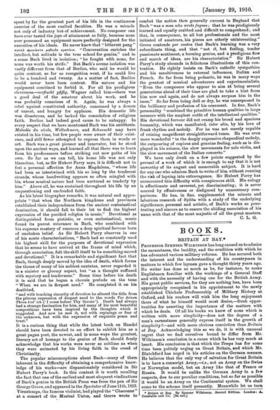MU SI C.
SIR HUBERT PARRY ON BACH.
ON a superficial and sentimental survey Bach might well be regarded as one of the most tragic figures in the annals of art. Here was a colossal genius, a supreme creative artist, in whom unexampled wealth of ideas was united to a superb command of the resources of expression. Yet by the irony of fate he was condemned to spend his life in obscurity, winning only partial recognition for the least of his talents, and practically none for the greatest ; slighted by his official superiors, who regarded him merely as an inefficient school- master ; and so inadequately remunerated for his pro- digious industry that his widow died in extreme poverty, and his last surviving daughter spent her declining years as a pensioner on the alms of the few musicians who remembered her father. More than this, Bach's fame waited nearly a hundred years for the beginning of that revival in which the majesty of his aims and the completeness of their realisation have gradually assumed their true pro- portions, and won for him his unique position among the greatest masters of his art. One of the many services which Sir Hubert Parry has rendered in this noble tribute to Bach* is to show that, while the tardy acknowledgment of his genius is a matter for natural regret, there is no ground for supposing that he was discouraged or embittered by lack of success or prosperity. The little that we know of his surroundings goes to show that he was happy in his home life. For the rest, he was in the rare position of one who
• John Sebastian Bach : the Story of the Development of a Great Personatity. By C. Hubert H. Parry. London: CF. P. Putnam's Sons. [12s. Eld. net.)
spent by far the greatest part of his life in the continuous exercise of the most exalted faculties. He was a miracle not only of industry but of achievement. No composer can have ever tasted the joys of attainment so fully, beeause none ever possessed an equipment more perfectly designed for the
execution of his ideals. He never knew that "bitterest pang" eek.ka eporieera n73eJ.t Kpaview. "Conversation enriches the intellect, but solitude is the true school for genius," and in a sense Bach lived in isolation; "he fought with none, for none was worth his strife." But Bach's serene isolation was vastly different from that of Berlioz, who said he would be quite content, so far as recognition went, if he could live to be a hundred and twenty. As a matter of fact, Berlioz would never have been content. His nature and his equipment combined to forbid it. For all his prodigious cleverness--verffacht pfirtg, Wagner called him—there was a good deal of the amateur about his work, and he was probably conscious of it. Again, he was always a rebel against constituted authority, consumed by a demon
of unrest, and hungry for applause. His domestic life was disastrous, and he lacked the consolation of religious faith. Berlioz had indeed good cause to be unhappy. In every respect that we have mentioned Bach was his antithesis. Maladie du siècle, Weltschmers, and Sehnsucht may have existed in his time, but few people were aware of their exist- ence, and still fewer attempted to express them in words or art. Bach was a great pioneer and innovator, but he stood upon the ancient ways, and learned all that there was to learn from his predecessors before striking out new paths of his own. So far as we can tell, his home life was not only blameless, but, as Sir Hubert Parry says, it is difficult not to feel a personal affection for Anna Magdalena, "whose life had been so intertwined with his so long by the tenderest strands, whose handwriting appears so often mingled with his, whose musical nature had been nurtured so tenderly by him." Above all, he was sustained throughout his life by an unquestioning and unclouded faith.
As his latest biographer remarks, it was natural and appro- priate "that when the Northern kingdoms and provinces established their independence from the ancient ecclesiastical domination, it should fall to their lot to find the highest expression of the purified religion in music." Devotional as distinguished from pietistic, or even ecclesiastical, music found its purest utterance in Bach, who combined with his supreme mastery of resource a deep spiritual fervour born of unshaken belief. As Sir Hubert Parry observes in one of his acute characterisations, "Bach had so constantly used
his highest skill for the purposes of devotional expression that he seems to have arrived at the frame of mind which,
through association, felt the skill itself to be something sacred and devotional." It is a remarkable and significant fact that Bach, though deeply moved by the idea of death, which forms the theme of many of his noblest cantatas, never regarded it in a sinister or gloomy aspect, but "as a thought suffused with mystery and tenderness." Some time before his death it is said that he began a chorale prelude on the tune "When we are in deepest need." He completed it on his deathbed,
"and with touching sincerity of devotion he altered the title from the piteous expression of deepest need to the words Vor deinen Thron fret' ich ('1 come before Thy throne'). Death had always had a strange fascination for him, and many of his most beautiful compositions have been inspired by the thoughts which it suggested. And now he met it, not with repinings or fear of the unknown, but with the expression of exquisite peace and trust."
It is a curious thing that while the latest book on Handel should have been devoted to an effort to exhibit him as a great pagan poet, the newest, and in some ways the greatest, literary act of homage to the genius of Bach should freely acknowledge that his works were never so sublime as when they were animated by his living faith in the creed of Christianity.
The popular misconceptions about Bach—many of them inherent in the difficulty of obtaining a comprehensive know- ledge of his works—are dispassionately considered in Sir Hubert Parry's book. In this context it is worth recalling the fact that one of the earliest and most eloquent vindications
of Bach's genius in the British Press was from the pen of Sir George Grove, and appeared in the Spectator of June 11th, 1853. Yieuxtemps, the famous violinist, had played the " Chaconne" at a concert of the Musical Union, and Grove wrote to combat the notion then generally current in England that Bach "was a man who wrote fugues; that he was prodigiously learned and equally crabbed and difficult to comprehend; and that, in consequence, to all but professionals and the most initiated of amateurs, his pieces are uttekly nhinteresting." Grove contends per contra that Bach's learning was a very subordinate thing, and that "not it, but feeling, tender passionate sentiment, a burning genius, and a Ptodigious flow and march of ideas, are his characteristics." Sir Hubert Parry's study abounds in felicitous illustrations of this con- tention. He rightly insists on Bach's catholic syttipathies and his sensitiveness to external influences; Italian and French. So far from being pedantic, he was In many ways the greatest of musical adventurers and experimentalists. "Even the composers who appear to aim at being several generations ahead of their time are glad to take a hint from him now and again, and do not always surpass him in the issue." So far from being dull or dry, he was unsurpassed in the brilliancy and profusion of his ornament. In fine, Bach's personality "combined the primitive human qualities in large measure with the amplest outfit of the intellectual qualities." His devotional fervour did not cramp his broad and spacious humanity, which was manifested, inter alia, by his love of frank rhythm and melody. For he was not merely capable of coining magnificent straightforward tunes. He was even more wonderful "in the deeply expressive rhapsodical melody, the outpouring of copious and genuine feeling, such as is dis- played in his ariosos, the slow movements for solo violin, and the slow movement of the Italian concerto."
We have only dwelt on a few points suggested by the perusal of a. work of which it is enough to say that it is not unworthy of its august and memorable subject. It is hard for any one who admires Bach to write of him without running the risk of lapsing into extravagance. Sir Hubert Parry has surmounted this difficulty with conspicuous skill. His eulogy is affectionate and reverent, yet discriminating; it is never marred by effusiveness or disfigured by unneceesary com- parisons. He has, in fme, supplemented the minute and laborious research of Spitta with a study of the underlying significance, personal and artistic, of Bach's works so pene- trating and sincere as to ensure the abiding association of his name with that of the most majestic of all the great masters.
C. L. G.























































 Previous page
Previous page